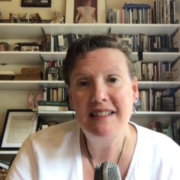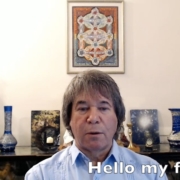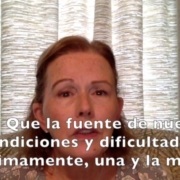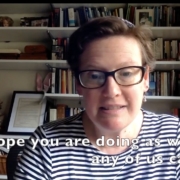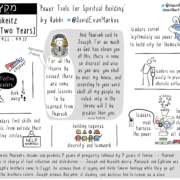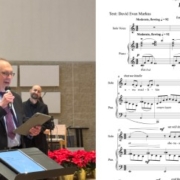Deciembre 2019: Palabras del Torá
Earlier this fall, three of Bayit’s co-founders traveled in Cuba with Rabbi Sunny Schnitzer of Cuba America Jewish Mission. We asked communities there what we could offer them after returning home, and they asked for video teachings. That’s the origin of this project: regular video “vorts” (words of Torah / teachings from Jewish tradition) offered in or translated into Spanish, designed for Cuban Jewish communities and available to Spanish-speaking Jews everywhere. This first video offering features a Chanukah teaching from Rabbi Sunny Schnitzer. We’re grateful to R’ Sunny, to the Cuban Jewish communities that welcomed us into their midst, and to Rabbi Juan Mejia for helping us bring this project to life. — The Builders at Bayit
Palabras del Torá / A “vort” of Torah – December 2019 – R’ Sunny Schnitzer from Bayit: Building Jewish on Vimeo.
Sigue leyendo para ver el texto del video en español e inglés. / Read on for the text of the video in Spanish and in English.
El famoso rabino Shlomo Carlebach cuenta una historia sobre un hombre que conoció en Moscú en la década de 1970, cuando las cosas todavía eran realmente malas para los judíos en la Unión Soviética.
Una noche, Shlomo estaba cantando en un salón de Moscú en Simjat Torá. Luego, este chico le cuenta a Shlomo su historia.
“Fui encarcelado porque soy judío. Sabía que los cargos eran falsos, pero no tenía defensa. Pasé casi diez años en un campo de trabajo siberiano. Durante la mayoría de esos años largos, fríos y amargos, no tuve contacto con ningún otro judío. Entonces, un día, escuché que otro judío había sido encarcelado en una celda al otro lado del campo. Decidí buscarlo, a pesar del peligro personal. Quería desesperadamente ver a otro judío, hablar con otro judío, decir “Shalom Aleijem” a otro judío antes de morir en ese desierto abandonado.”
Cuando lo encontré, susurré: “Shalom aleijem, landsman (paisano)”.
Volvió la cabeza ligeramente y susurró: “¡Ahora no! No se nos permite hablar. Saben que somos judíos. ¡No dudarán en disparar si rompemos las reglas!”
Ignoré su súplica y seguí susurrando; “¿Sabes que esta noche es la primera noche de januká?”
“¡¿Y qué?!”, exclamó, su susurro cada vez más fuerte y más agitado. “¿De qué nos sirve ser judíos? ¿A dónde nos ha llevado?”
Yo persistí. “Escucha, he estado en este campo de prisioneros por casi diez años. Todo este tiempo, he buscado otro judío. Cantemos juntos Maoz Tsur. ¿Recuerdas cómo va?”
Las lágrimas llenaron los ojos de mi amigo. Susurró: Yo solía cantar Maoz Tsur con mi padre cuando era un niño pequeño. No lo he escuchado desde entonces “.
Le rogué que se uniera a mí. Comenzó a tararear la melodía suavemente. Vaciló con las palabras.
Mientras cantaba, su voz se hizo más fuerte. No notamos la conmoción en la torre de vigilancia.
Parecía que los guardias tenían como objetivo dispararnos por perturbar la paz. Entonces oímos gritos. El capitán ordenaba a los guardias que se detuvieran.
Bajó de la torre de vigilancia y se acercó a nosotros.
Apuntó su arma hacia nosotros y preguntó: “¿Qué están haciendo ustedes dos judíos?”
Respondí tan educadamente como pude: “Estamos cantando una canción”.
“¡Entonces canta más!” ordenó el capitán.
“No nos deshonre haciéndonos cantar más. Sabemos que nos disparará. Hágalo ahora. ¡Termine con esto! “, supliqué.
La voz del capitán de repente se volvió más amigable.
“No voy a dispararte. Continúa cantando esa melodía. Quiero escucharla.”
Reanudamos el canto.
Mientras cantamos, vimos lágrimas llenar los ojos del capitán y rodar por sus mejillas.
Cuando terminamos, el capitán habló.
“Cuando comenzaste a cantar, tuve un vago recuerdo de escuchar esa melodía antes. De repente, los recuerdos de ir a la sinagoga con mi padre me invadieron. Cuando tenía doce años, fui reclutado por la fuerza en el ejército. Llegué al rango de capitán. No tuve conexión con mi familia durante años. Ahora me doy cuenta de que todavía soy judío, aunque han pasado al menos cuarenta y cinco años desde que tuve algo que ver con mi gente. Esta noche entiendo que todavía soy parte del pueblo judío.”
Espontáneamente, los tres comenzamos a cantar Maoz Tsur nuevamente. Nuestros ojos se llenaron de lágrimas. No sé si alguna vez volveré a experimentar un momento tan santo.
Después de que terminamos, el capitán prometió que haría todo lo que estuviera en su poder para acelerar nuestra liberación. Esperamos la mayor parte del año hasta que estuvimos libres. Vine a Moscú para celebrar Simjat Torah con mi gente. Bendíceme que el próximo año seré libre como tú. Bendíceme que el año que viene podré bailar en las calles de Jerusalén en Simjat Torá.”
Mis amigos, nuestra gente sabe lo que es ser cautivo.
Todos recordamos a Alan Gross. Fue un momento difícil para las comunidades judías cubana y estadounidense. Durante su cautiverio, los líderes de la comunidad judía cubana visitaron a Alan en cada festividad judía. Nunca se olvidaron de él. Cuando Alan habló con los medios, pocas horas después de su liberación en 2014, las primeras palabras que salieron de su boca fueron “Jag Sameaj”.
Alan Gross no fue encarcelado porque era judío. Sobrevivió porque era judío. La lección aquí para nosotros es que siempre debemos recordar el poder de nuestra gente y nuestra fe.
Januká Sameaj, mis amigos.
Reb Shlomo Carlebach tells a story about a man he met in Moscow in the 1970’s when things were still really bad for the Jews in the Soviet Union.
One night Shlomo was singing in a hall in Moscow on Simchat Torah. This guy comes up to him to tell Shlomo his story.
“I was incarcerated because I am a Jew. I knew the charges were false, but I had no defense. I spent almost ten years in a Siberian labor camp. For most of those long, cold bitter years, I had no contact with any other Jews. Then, one day, I heard that another Jew had been incarcerated in a cell on the other side of the same prison camp. I decided to seek him out, despite personal danger. I desperately wanted to see another Jew, to talk to another Jew, to say “Shalom Aleichem” to another Jew before I died in that forsaken wasteland.
When I found him, I tiptoed over to him.
I whispered: ‘Shalom Aleichem, landsman (my friend and neighbor).’
He turned his head slightly and whispered: ‘Not now! We are not permitted to talk. The soldiers on the ramparts can shoot us at any minute. They know we are Jews. They will not hesitate to shoot if we break the rules!’
I ignored my fellow Jew’s plea and continued to whisper to him. ‘Do you know what tonight is?’
‘How am I supposed to know what tonight is?’ he demanded.
‘Tonight is the First Night of Chanukah.’
‘So what!’ he exclaimed, his whisper growing louder and more agitated. ‘What good does being Jewish do for us? Where has it gotten us?
I persisted. ‘Listen, I’ve been in this prison camp for almost ten years. All this time, I’ve searched for another Jew. Let’s Maoz Tsur together. Do you remember how it goes?’
Tears filled my friend’s eyes. He whispered, ‘I used to sing Maoz Tsur with my father when I was a little boy. I haven’t heard it since then.’
I begged him to join me in singing. He began to hum the melody softly. He hesitated with the words. Finally, he recalled them.
As he sang, his voice grew louder and more distinct. We did not notice the commotion in the watchtower, for we were so absorbed in what we were doing.
It seemed that the guards were aiming to shoot us for disturbing the peace. Then we heard shouting. The captain was ordering the guards to halt.
He descended from the watchtower and walked over to us.
We trembled when we saw him standing beside us. He aimed his gun but held it steady. Then he demanded gruffly: ‘What are you two Jews doing?’
I answered as politely as I could. ‘We are singing a song.’
‘Then sing more,’ the captain commanded.
‘Please don’t disgrace us by making us sing more. We know you will shoot us. Do it now. Get it over with!’ I pleaded.
The captain’s voice suddenly became more amicable.
‘I am not going to shoot you,’ he said. ‘Please continue to sing that melody. I want to hear it.’
We resumed singing.
As we sang, we saw tears fill the captain’s eyes and roll down his cheeks.
When we finished, the captain spoke.
‘As you began to sing,’ he said, ‘I had a vague recollection of hearing that melody before. Suddenly, memories of going to the synagogue with my father swept over me. When I was twelve years old, I was forcibly conscripted into the army. I rose to the rank of captain. I had no connection with my family for years. Now I realize that I am still a Jew, although it has been at least forty five years since I had anything to do with my people. Tonight I understand that I am still part of the Jewish people.’
Spontaneously, the three of us began singing Maoz Tsur again. Our eyes overflowed with tears. I do not know if I will ever experience such a holy moment again.
After we finished, the captain promised that he would do everything in his power to hasten our release. We waited the better part of a year. Then, a few weeks ago, orders for our release were received. I came here to Moscow to celebrate Simchat Torah with my people. Bless me that next year I will be free like you. Bless me that next year I will be able to dance in the streets of Jerusalem on Simchat Torah.”
My friends, our people know what it is to be captive.
We all remember Alan Gross. It was a difficult time for the Cuban and American Jewish communities. During their captivity, the leaders of the Cuban Jewish community visited Alan at each Jewish holiday. They never forgot him. When Alan spoke with the media, a few hours after his release in 2014, the first words that came out of his mouth were Chag Sameach.
Alan Gross was not jailed because he was Jewish. He survived because he was Jewish. The lesson here for us is that we must always remember the power of our people and our faith.
Chanukah Sameach my friends.
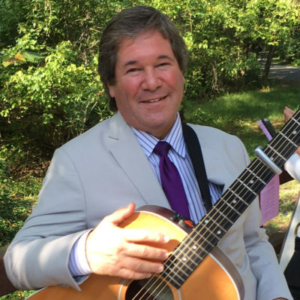
By Rabbi Sunny Schnitzer. Translated by Rabbi Juan Mejia.

